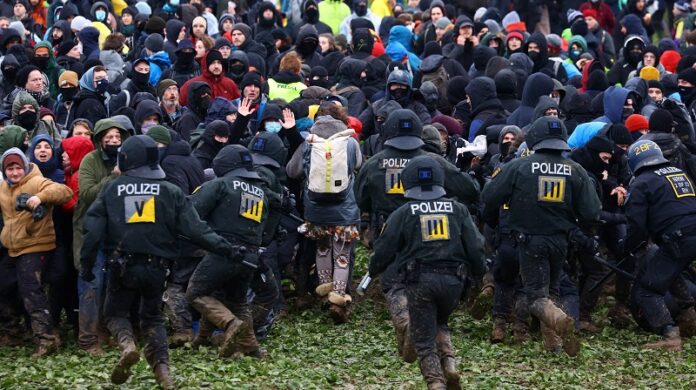“The Global Trend of Criminalizing Climate and Environmental Protests: A Disturbing Report”
Oscar Berglund, a senior lecturer in international public and social policy at the University of Bristol, and Tie Franco Brotto, a PhD candidate at the University of Bristol’s School for Policy Studies, have recently published a report highlighting the global trend of criminalizing and repressing climate and environmental protests.
The report, co-authored with three other University of Bristol colleagues, sheds light on the increasing difficulty faced by activists around the world in advocating for climate justice. The criminalization and repression of such protests are not limited to specific countries but are a global phenomenon, affecting both democratic and less democratic nations.
The report distinguishes between climate protests, which aim to mitigate climate change by reducing carbon emissions and making broader policy demands, and environmental protests, which target specific environmentally destructive projects such as oil and gas extraction, deforestation, and mining.
The intensifying criminalization and repression of climate and environmental protests take four main forms:
1. Anti-protest laws: Many countries have introduced legislation that gives police more power to stop protests, introduces new criminal offenses, and increases sentence lengths for existing offenses. Since 2019, 22 such laws have been implemented in the 14 countries studied.
2. Criminalization through prosecution and courts: Activists are being charged with offenses typically reserved for terrorism or organized crime, preventing them from mentioning climate change in court, and facing lower thresholds for prosecution. In some cases, corporations have taken out injunctions against protesters.
3. Harsher policing: From surveillance and arrests to violence and infiltration, activists are facing increased scrutiny and intimidation from both state and private actors. In some instances, police have been accused of collaborating with corporations to evict protesters.
4. Killings and disappearances: In the most extreme cases, environmental activists are being murdered, often following threats from various actors. This trend is particularly prevalent in countries like Brazil, the Philippines, Peru, and India.
The report also highlights the increasing number of climate and environmental protests globally, with data showing a significant rise in such activities in recent years. While the average percentage of protests facing police violence is 3% and arrests is 6.3%, there are significant variations across countries. For example, Australia and the UK have high arrest rates due to the presence of groups like Extinction Rebellion, while countries like Peru and Uganda have high levels of police violence.
Overall, the report underscores the need for greater attention to the repression of climate and environmental protests, especially in a context where governments are failing to take adequate action on climate change. By criminalizing activists, states are depoliticizing their cause and diverting attention from the urgent need for environmental protection and climate action.
